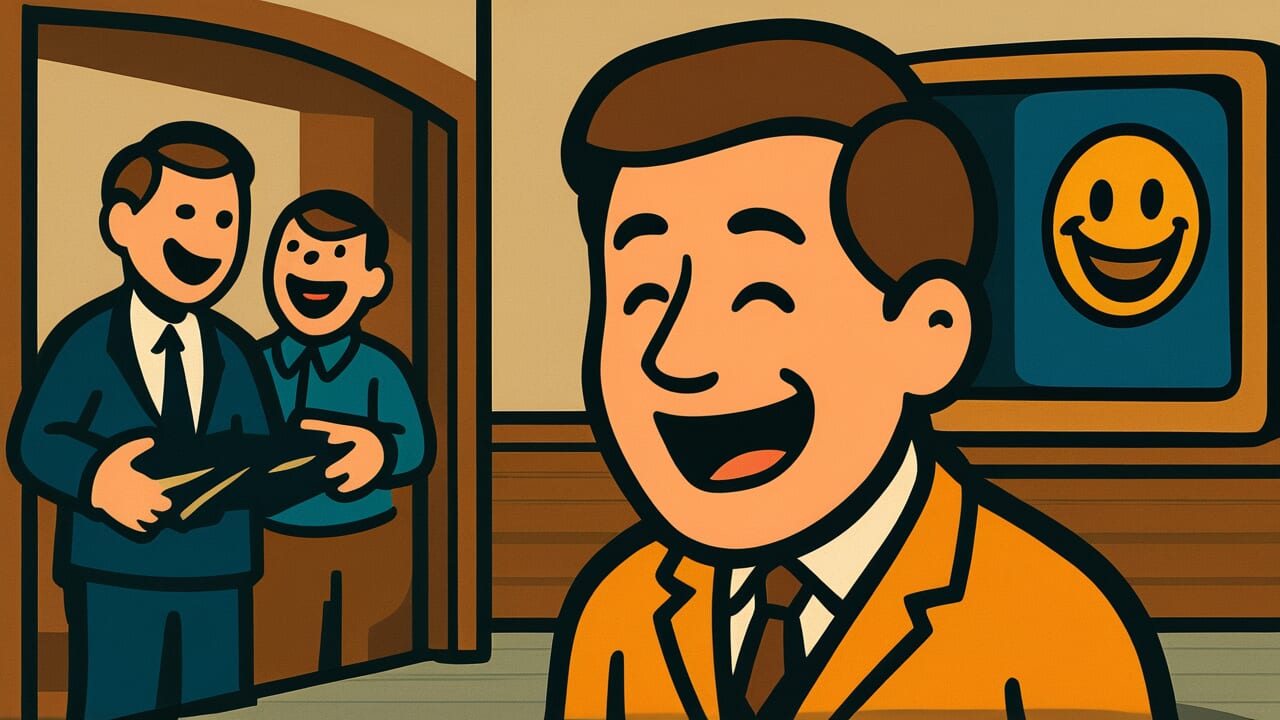How to Read “A man laughs once every three years”
Otoko wa sannen ni ichido warau
Meaning of “A man laughs once every three years”
“A man laughs once every three years” is a warning that men should rarely laugh. This proverb conveys the belief that men should always maintain a serious and strict attitude. They should not easily show a smile.
The act of laughing was seen as a sign of letting one’s guard down or being frivolous. It was thought to damage a man’s dignity and character.
This proverb was used to teach young men about emotional control. Laughing loudly in public or at trivial matters was considered undignified for a man.
The teaching emphasized that maintaining a calm and composed attitude at all times was a requirement for a trustworthy man. By modern standards, this teaching seems extremely harsh.
However, it was widely accepted as the ideal image of masculinity at that time.
Origin and Etymology
The exact source of this proverb is unclear. However, it is believed to strongly reflect the spirit of bushido, the way of the samurai.
During the Edo period, showing emotions was considered a sign of immaturity among the samurai class. Laughter in particular was warned against as a symbol of frivolity.
The expression “once every three years” is rhetorical rather than literal. It emphasizes extreme rarity. Japanese has many phrases using the number “three” to emphasize things, like “three days and three nights” or “three meals a day.”
Here, “three years” is used to mean an extremely long period.
Samurai education demanded constant readiness for death and composure at all times. Laughing was seen as letting one’s guard down. It could show weakness to an enemy.
Confucian influence cannot be overlooked either. Confucianism values propriety and considers emotional restraint a requirement for a gentleman.
Within this cultural background, men, especially samurai-class men, were expected to suppress emotional expression including laughter as a virtue. Such values likely crystallized into this proverb.
Usage Examples
- He’s such a strict person who truly embodies “A man laughs once every three years,” so his subordinates feel tense around him
- My grandfather’s generation was raised hearing “A man laughs once every three years,” but it’s an unthinkable value system today
Universal Wisdom
The proverb “A man laughs once every three years” contains deep insight about the relationship between emotion and dignity. Why did people find value in suppressing laughter?
It’s because emotional expression was directly connected to power dynamics in human relationships.
Laughter is fundamentally an act of lowering one’s defenses. When laughing, a person becomes vulnerable. Vigilance relaxes, critical thinking stops, and one enters a state of accepting others.
That’s why people living in constant tension treated laughter carefully.
Behind this proverb lies a universal question about leadership. How much should those in leadership positions show their emotions? How should they balance approachability and dignity?
This is a timeless challenge.
This proverb also shows how “masculinity” is a socially constructed concept. There was an era when suppressing emotions was considered a male virtue. It functioned as a survival strategy.
However, such values also placed enormous psychological burdens on individuals. As a human essence, laughter is an expression of joy and an important means of deepening bonds with others.
When AI Hears This
If we consider emotions through thermodynamics, laughter corresponds to “rapid energy release.” Just as water remains quiet up to 99°C but suddenly boils at 100°C, emotions also have critical points.
Not laughing for three years means continuously storing emotional energy inside the system. In physics, when energy accumulates, the system’s “free energy” increases.
In other words, the potential power that can be released at any time grows. People who laugh a little each day release energy in small amounts to stabilize the system.
Meanwhile, someone who laughs only once every three years continues compressing energy until reaching a critical point.
Interestingly, this accumulation method might actually be more efficient. In chemical reactions, nothing happens until you overcome the activation energy barrier.
Small stimuli cause nothing, but once a threshold is crossed, the reaction proceeds all at once. Emotions work the same way. Because of three years of accumulation, the energy release when laughing becomes enormous.
This is a phase transition phenomenon itself. The moment ice becomes water, the temperature where a magnet loses magnetism—none of these change gradually. They all suddenly shift state at a certain point.
Emotional expression occurring as discrete events rather than continuously might actually provide higher system stability.
Lessons for Today
What this proverb teaches modern people is that “correctness” changes with the times. Emotional suppression once considered a male virtue is now recognized as a factor that harms mental health.
This shows we shouldn’t blindly accept traditional values. We need to understand the intentions behind them and reinterpret them in forms suitable for today.
At the same time, this proverb contains the universal truth about the importance of emotional control. While completely suppressing laughter is unnecessary, appropriate emotional expression for each situation remains an important skill, now as then.
During important negotiations or when listening to someone’s serious story, inappropriate laughter damages trust.
What you need is neither extreme suppression nor unlimited expression, but flexible responses according to situations. Laugh wholeheartedly when you should laugh. Take a sincere attitude when seriousness is required.
This sense of balance is the maturity required of us living in modern times.



Comments